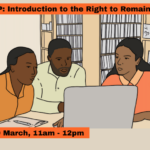
This is a guest blog post by Hyab Yohannes. Hyab is a PhD candidate at the University of Glasgow, the first holder of the UNESCO RILA PhD Scholarship, and a member of the Right to Remain Management Committee.
From the outset, I have to warn you, dear reader, that I am not trying to dispute the subject matter of ‘decolonising asylum’ in this short blog but rather raise a fundamental question, thus: How can we ‘decolonise’ our relation with the ‘Other’? Indeed, this represents an invitation for everyone interested to imagine a way of life beyond the mere conventional framing of ‘coloniality’.
As Professor Nelson Maldonado-Torres has written, coloniality is:
the catastrophic transformation of whatever we can consider as human space, time, structure, culture, subjectivity, objectivity, and methodology, into dehumanizing coordinates or foundations that serve to perpetuate the inferiority of some and the superiority of others.
Decoloniality is a mode of critique that seeks to understand and challenge these exclusive practices of othering and the hierarchical understanding of the human. As typical subjects of coloniality, refugees and people seeking asylum are often exposed to regimes of othering, bordering and ordering. Thus, countering the persistence of these exclusive practices would necessitate decolonising asylum.
In a bid to better formulate my question, let me now turn to what I would call ‘the refugee’s triple loss’, or rather, the loss of ‘home’, loss of ‘humanity’, or arguably the worst, loss of ‘hope’. Home is neither a place nor does it necessarily constitute specified persons; it is a relation of sociality – “the self and its relation to the other in time and space”. Involuntarily displaced, the refugee has lost his/her human-to-human connectivity, along with spatial and temporal relations. What this loss of home means in actuality is that refugees are stripped of their capacity for socio-political existence and situatedness in time and place. Once rendered unintelligible, they succumb with total submission to biopolitical and necropolitical b/ordering. This total surrender is epitomised by accompanying apocalyptic imagery of refugees dying at borders, in deserts, in camps, or lost at sea. Indeed, unfortunately they often die in the process of seeking the asylum that they are so often denied systematically.
In the global order in which we live, the state has assumed the role of policing one’s access to being classified as a human entity. And in this system of b/ordering, the homeless refugee is thrown into the realm of the sub-human. We all know that refugees lose their lives merely to be human. Refugee life is a life lived amid the daily admission of vulnerability and violability. Once they have lost state protection, humanity for the refugees is a condition of impossibility within the frame of coloniality. They are taken hostage in a state of an “incomplete death” as Frantz Fanon famously said. Or, according to Maldonado-Torres, they “live with death and are not even “people””.
The last point I wish to raise concerns the issue of ‘hope’. Hope remains the most potent force refugees have at their disposal. It is the only means available to them to sustain their survival and aim at effecting change. In that sense, hope is the struggle of the oppressed – one that is propelled into the future. To put it more succinctly, it is a tacit resistance against the ‘coloniality’ of the future and conditions of impossibility for its decolonisation. Losing hope, therefore, is an involuntary admission of coloniality to be the norm of the present and the future. The state reifies this involuntary admission of hopelessness by negating refugees’ humanity, rendering them rightless corporealities.
I have now briefly introduced what I mean by the refugee’s triple loss. I have also suggested that refugees are rendered homeless, sub-human and hopeless by the very same world order in which we all reside. Here now comes a more fundamental question, thus: If the ‘world-order’ we live in is rendering our fellow human beings politically untilligible and reduces them to sub-humanity, and if it is keeping them hopeless in an impoverished and precarious state of being, then what kind of b/ordering is this? And, most importantly, what can we do about it? Is the right to asylum the only answer?
Well, asylum might represent a potential response but for success we must inherently decolonise the asylum system itself. We have to imagine beyond the conventional thresholds and parameters set by the state in conjunction with its mutant twins: charity and humanitarianism.
It is time to accept that neither the granting of declaratory ‘right to remain’ nor the provision of ‘daily bread’ can shake the omnipresence of coloniality.
We have to think of repairing the losses of home, humanity and hope. These losses cannot be permanent, however institutionalised they might appear to be. Thus, the impermanence of these seemingly permanent losses must be examined and subjected to a permanent disclosure from which possibilities for radical change can be inferred. Furthermore, decolonial work – the work of destroying the conditions of impossibility while also opening multiple possibilities for co-existence – is the ultimate activation of the decolonisation of the notion of asylum.
I cannot offer a shred of thought, at least for the purposes of this blog, on how decolonising asylum can be achieved at empirical, conceptual, or, indeed, policy levels. I therefore leave the question open for the more inquisitive among us through the most tremendous tool in our possession: imagination. I wish to orient the question as an invitation for a ‘decolonial turn’, which according to Maldonado-Torres, is “the definitive entry of enslaved and colonized subjectivities into a realm of thought at before unknown institutional levels”.














Discussion: